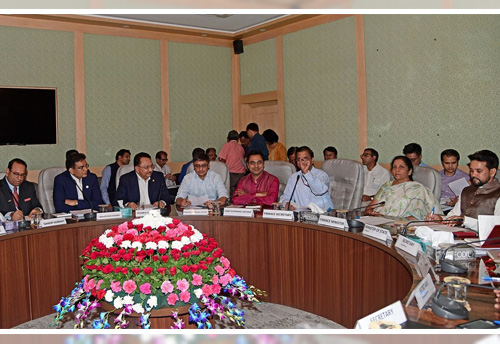New Delhi, June 13 (KNN) To bring fiscal reforms to check liquidity crisis faced by the Micro Small and Medium Enterprises (MSMEs), the Federation of Indian Micro and Small & Medium Enterprises (FISME) has suggested numerous measures to Finance Minister Nirmala Sitharaman for incorporating in the Union Budget to be presented next month.
FISME, an apex body of MSME associations in the country, submitted a pre-budget memorandum ranging from proposing to create a multi stake holder agency to bringing all listed companies on TReDS.
FISME proposed the Government to create a multi-stake holder Agency on the lines of Credit Bureau (under Governmentt control). The Agency may be provided access to big data of GST, bank transactions and ROC filings based on which it would automatically create credibility report of companies.
FISME said the move would allow access to these reports to those who are willing to subscribe and on reciprocal basis ready to share the data– similar to CIBIL. It may create a scoring model based on the data analysis.
In addition, it will help in data analysis of delays in payments and could work as an early warning system for potential defaulters and likely NPAs which could be extremely useful for Banks also. This will have a salutary impact on instilling payment discipline as well, said FISME.
It is a market based mechanism to address the delayed payment problems experienced by MSMEs, it added.
To make the TReDS more effective and broad-based, all listed companies may be asked to upload their bills, another key recommendation FISME made to the Ministry.
“There is an urgent need to introduce tax breaks to promote investment in capital goods on the same lines as depreciation and thereby generate employment. The current dispensation excludes most MSMEs from taking advantage of investment allowance," said FISME.
In this regard, the federation suggested “Under Section 80-I, investment allowance on capex should be given without any lower threshold; even at a higher rate/ MSMEs not excluded.”
To encourage expansion and enhanced economic activity, the exemption from Capital gain tax could be extended to industrial/ commercial properties also, suggested FISME.
With regard to IGST refund for exporters, FISME pointed “During the initial phase of implementation GST, when neither exporters nor the officials were fully aware how the system would function, there have been many errors of commission and omission committed from both sides. Such cases include pending refund of IGST paid on goods exported during the transitional period (i.e. 01.07.2017-30.09.2017) in cases where higher rate of Duty Drawback was claimed under column A. And cases where Duty Drawback rates were identical in Column A and Column B, but drawback was claimed under Column A instead of B.”
One time opportunity could be given to all exporters who have a grievance with regards to refund of IGST. Exporters must be allowed to revise their returns/ choices and their refunds processed accordingly, recommended FISME.
The Ministry of Corporate Affairs in consultation with Ministry of Law and Justice should pass appropriate clarifications / changes to ensure the creation of a separate sub-category of MSME within the operational creditors and accord the MSMEs with special rights of recovering full payments due against the companies facing CIRP or Liquidation under MSMED Act, an apex body of MSME suggested.
MSMEs be given the status of Financial Creditors under Insolvency & Bankruptcy Code, 2016 and accorded special rights of recovering full payments due against the companies facing CIRP or Liquidation under MSMED Act, it added.
“Inability to access land has become the biggest bottleneck for industries. Without improving access to affordable industrial land there is little hope for new industries to come up. Today setting up an MSME after purchasing land and building has become unviable at in most cities”, said FISME.
In this matter to bring down the cost of land for industries, FISME suggestions includes allow Stamp duty paid to be treated as ITC in future; ease of transferability and change of use of land; pass the Land Titling Bill pending in Parliament; create large scale ‘Plug and Play’ infrastructure/ ready to move industrial sheds offered to MSMEs on affordable rent.
Besides this, FISME raised the issue of unilateral increase in claim period of Bank Guarantee (BGs) by Banks.
It said “While issuing a fresh Bank Guarantee (BG) or extending any existing one, Banks have increased ‘claim period’ of minimum one year from the date of expiry of validity period of the BG and charge accordingly. Generally BGs are issued with no claim period or maximum 3 months claim period. Now even if one requires a BG for six months, Banks would charge for 18 months. MSMEs already suffer from high cost of BGs as Banks demand upfront margin money, then charges for period the BG is in use and more than 100% collateral against BGs.”
It will have very adverse impact both on exports and large number of MSMEs supplying through tenders both to the Government as well as private agencies.
In this connection, FISME suggested “Firstly, there is a need to thoroughly review the Banking practices for issuing the BGs and issue guidelines on price band too. Secondly, the claim period should be restricted to the period of validity of BG. Thirdly, the BGs being non-fund based financial product used to cover future risk, they should be allowed to be offered by Insurance companies as is the case in other countries such United States. This will increase competition and reduce cost.”
Published On : 13-06-2019
Source : KNN India

